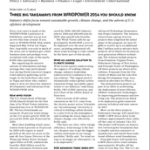Yes, it’s that time of year — time for making your 2013 New Year’s resolutions. While I am not a big resolution guy and recognize that most are broken by the end of the month, it does make sense to step back and see areas for improvement. This is for an organization as well as an individual. So here are my suggested 2013 resolutions for your logistics organization:
Resolve to do a better job of measuring your logistics performance. As the old saying goes, “what gets measured gets done.” Simplify what you are measuring. Pick no more than a half-dozen key logistics performance indicators that will drive either budget execution and/or customer satisfaction. If possible, measure daily. If not, measure weekly. Most importantly, you need to share your results with as many people as possible within your company — not just people within logistics. The non-logistics departments, such as sales and marketing, and accounting, need to know logistics performance if for no other reason than to get others informed.
With the amount of uncertainty about the economy, it is time to focus on fundamentals. Resolve to keep core logistics competencies that you perform well and delegate other logistics functions to peers who are more qualified in those functions. If I learned anything in my career, it is to rely on people or organizations who are among the best in their areas. It may initially seem a little counterintuitive since sometimes this may appear to be more costly up front. But professional, competent partners will ultimately reduce your costs in the long run. If you need to be reminded of this, just reflect on some of your home projects you may have tried to tackle. This is reminiscent of someone saying “we are going to save money no matter what we have to do.”
Along with identifying your strengths and weaknesses, strive to improve at what you do well. Invest in getting even better at those logistics tasks. This will assist in retaining customers, reducing your logistics costs (even while outsourcing some of the tasks), and attracting new customers (because you are now operating at a much higher level than your competition). Invest in more training or better technology in your best logistics functions. If possible, have others do the other logistics tasks that you are only average at. They are investing in getting better and hence you will benefit.
This year, resolve to place more emphasis on preparation. Do the necessary hard work up front to be as prepared as possible — whether it is for a project, and audit, a sales campaign or anything that going to affect sales or reduce costs. In logistics, this could mean being as prepared as possible for transportation negotiations by knowing all the details about the markets, the capacities and performance of your potential or current clients. The better prepared you are, the luckier you seem to get.
Resolve to praise in public, but criticize in private as attributed to Kenneth Blanchard in “The One Minute Manager.” Keep people, partners, customers and vendors apprised on their performance. People and organizations desire to be appreciated. Take time to tell them that they are doing a good job. Praise will go a long way to motivate them to do even better. All this really costs is a little time to pick up a phone or send a quick e-mail to tell them. If at all possible, try praise them in public. Conversely, do not hesitate to criticize constructively. The key word here is constructive. Have a purpose for the criticism to drive an expected outcome. Venting without purpose is counterproductive. Most importantly, if you plan on using constructive criticism, do so privately. Either way, praise or criticism, people and organizations do appreciate knowing where they stand.
Finally, do not settle for the status quo. Find the energy to compete and excel in logistics. Here’s to good fortune for you personally and for your company in making 2013 a good year.





































